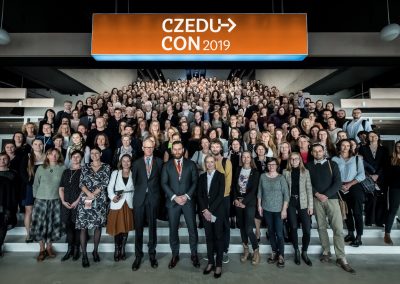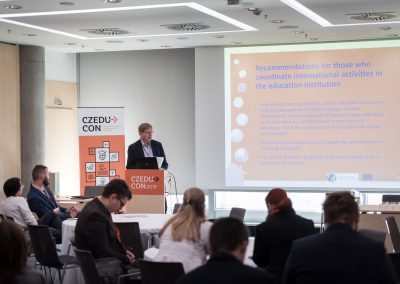Forum on International Higher Education
15.–17. 6. 2021
| This Year’s Theme: |
(Un)prepared for change?
CZEDUCON is a meeting platform for experts in the field of internationalisation of higher education institution. In the Czech Republic it is the largest event of its kind. The conference is organised by the Czech National Agency for International Education (DZS) under the patronage of the Ministry of Education, Youth and Sports.
This year’s subtitle is (Un)prepared for change? Visitors have 3 days full of information and number of reputable guests to look forward to.
| Main thematic areas: |
Crisis ManagementThe challenges of globalizations are numerous and interconnected: from the current COVID-19 pandemic, climate change, to economic and safety risks, and the list goes on. Universities need to react, be it to respond as an institution, or to help find effective solutions. What can they do to prepare for these challenges and unfavourable situations? How should they act and communicate?
|
|
New Erasmus+ PeriodThis year marks the beginning of a new Erasmus+ budget period (2021–2027). Digitalisation, inclusion and sustainability are the topics that will shape this new phase. What will these changes mean for applicants and project coordinators? How will these priorities influence project realization? What can schools do to manage these changes the best they can?
|
|
New Internationalization PrioritiesThe COVID-19 pandemic, and the digitalization process it accelerated, are shaping the priorities of internationalization significantly. While the number of physical mobilities has dropped, online education is making international activities accessible to a broader group of learners. There have also been changes in administration, marketing, or admission of international students. The topics of social responsibility and sustainable growth are ever more current. What can universities do to deal with these challenges?
|
|
Strategic Management and Capacity BuildingStrategic approach and internal capacity building are necessary for further development of internationalization in universities, be it management of international students, language improvement, or intercultural capabilities of students and teachers. How does one manage internationalization on a strategic level? What methods and measures can help improve the internalization student experience? How can local and international students and employees develop necessary capabilities with regard to internationalization?
|
| Keynote speakers: |


Dana Petrova
Czech National Agency of International Education and Research, Director
Dana Petrova is the Director of the Czech National Agency for International Education and Research (DZS) since 2016. She has extensive experience with coordination of EU programmes at the national level, quality project assessment and strategic leadership in international education. She worked as Director of the Office for International Cooperation at Masaryk University in Brno, Czech Republic and later at CHE Consult GmbH, a Berlin based consulting company, where she worked on research studies and projects such as the Erasmus Impact Study for European Commission. She is a member of the EAIE Awards and Talent Committee, the chair of the Fulbright Commission Board in the Czech Republic, and the Vice-President of ACA (Academic Cooperation Association).
Pavel Doleček
Ministry of Education, Youth and Sports, Deputy
Pavel Doleček has been appointed the Deputy Minister for Higher Education, Science and Research at the Ministry of Education, Youth and Sports for the Czech Republic in 2017. He is responsible for the conception and realization of national policies in the area of higher education, research and development, including international bilateral and multilateral cooperation, legislative framework a funding policy. He formerly served as a Czech delegate in an expert committee on the institutional management in higher education in OECD. Pavel Doleček is also a member of several expert advisory bodies, board and commission that focus on education, innovation, and research. He is a member of the Fullbright Commission Board and the chairman of the Board of Supervisors of the Centre for Higher Education Studies.




Hana Machková
Prague University of Economics and Business, Rector
Hana Machková has been appointed the rector of the Prague University of Economics and Business (PUEB) in 2014. She has been in charge of the French-Czech Institute of management since 1990. She has graduated from PUEB in Economics and International Business Management. From 2006 to 2014 she acted as the Pro-Rector for International Affairs and PR and the head of the Department of International Trade. In 1996 she was awarded the Order of Academic Palm by the French government and in 2016 she received the highest French national award Legion of Honour. She has been teaching at ialyon, School of Management for over 20 years and is a member of the iaelyon International Advisory Board. She is also a member of the CEMS Strategic Board, the Board of Management of EIASM and the International Advisory Board WU Vienna.
Martin Bareš
Masaryk University, Rector
Professor of Neurology and since 2019 the Rector of Masaryk University. From 2018-2019 the Dean of the Faculty of Medicine at Masaryk University. Named Adjunct Professor at the Department of Neurology, Medical School, University of Minnesota, in 2015. Since 2021 he is the representative of the Czech Rectors Conference in the European University Association (EUA) Global Strategy Response Group, an advisory body to the European Commission.


Crisis Management
The challenges of globalizations are numerous and interconnected: from the current COVID-19 pandemic, climate change, to economic and safety risks, and the list goes on. Universities need to react, be it to respond as an institution, or to help find effective solutions. What can they do to prepare for these challenges and unfavourable situations? How should they act and communicate?
New Erasmus+ Period
This year marks the beginning of a new Erasmus+ budget period (2021–2027). Digitalisation, inclusion and sustainability are the topics that will shape this new phase. What will these changes mean for applicants and project coordinators? How will these priorities influence project realization? What can schools do to manage these changes the best they can?
New Internationalization Priorities
The COVID-19 pandemic, and the digitalization process it accelerated, are shaping the priorities of internationalization significantly. While the number of physical mobilities has dropped, online education is making international activities accessible to a broader group of learners. There have also been changes in administration, marketing, or admission of international students. The topics of social responsibility and sustainable growth are ever more current. What can universities do to deal with these challenges?
Strategic Management and Capacity Building
Strategic approach and internal capacity building are necessary for further development of internationalization in universities, be it management of international students, language improvement, or intercultural capabilities of students and teachers. How does one manage internationalization on a strategic level? What methods and measures can help improve the internalization student experience? How can local and international students and employees develop necessary capabilities with regard to internationalization?
2019
Second annual conference with focus on internationalisation of higher education hosted over 500 participants who could choose from 42 speeches, panel discussions or workshops. Among the main speakers were EAIE President Sabine Pendl, global higher education strategist Rahul Choudaha or ACA President Ulrich Grothus.
2018
The first annual conference to become meeting platform for experts in the field of internationalisation of higher education institution. The cross-cutting theme, 20 years on the wave of international education, responded to 20th anniversary of the Czech Republic’s participation in the Erasmus program. Former EAIE President Marcus Laitinen and European Commission Representative, among others, presented their views on the internationalisation of education in Europe.
For more information please contact us at czeducon@dzs.cz or +420 221 850 100.

















